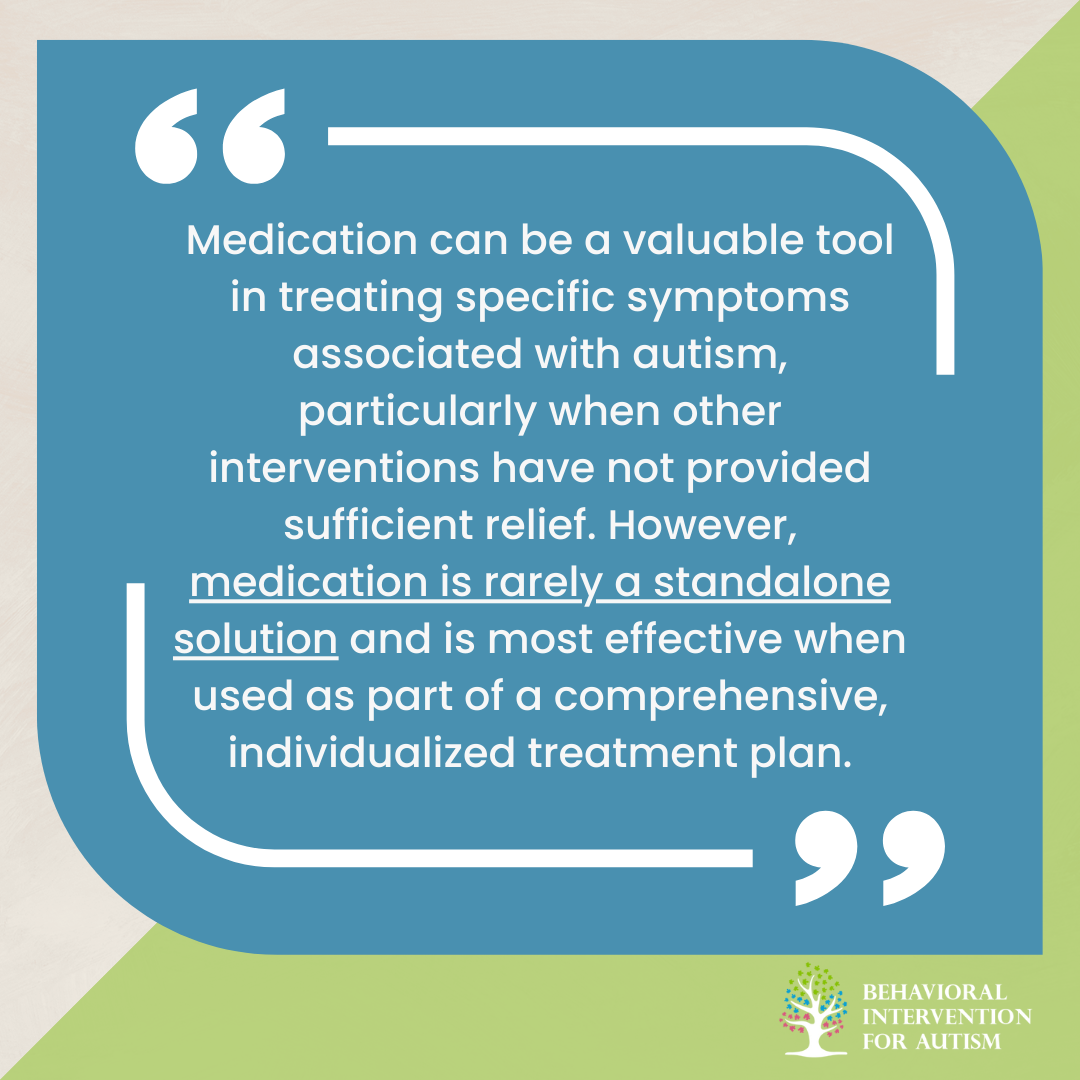
Table of Contents
Autism Spectrum Disorder (ASD) is a complex neurodevelopmental condition that affects behavior, communication, and social interaction. While there is no “cure” for autism, a variety of therapeutic interventions, including behavioral therapies, occupational therapies, and educational programs, can support individuals in developing skills and managing symptoms. Medication is also a consideration for some people with autism, particularly when symptoms are severe or when other approaches have not provided sufficient relief.
This article explores how medications can play a role in the treatment of autism. We’ll cover the primary classes of medications, their purposes, potential side effects, and the factors that families and individuals may need to consider when deciding if medication is the right choice.
Understanding the Role of Medication in Autism Treatment
Medication is typically not the first line of treatment for autism, as behavioral and educational therapies are often prioritized. However, medication can be essential when individuals experience symptoms that interfere significantly with their daily lives or their ability to benefit from other therapies. Common symptoms that may lead to a consideration of medication include aggression, severe irritability, hyperactivity, anxiety, depression, and repetitive behaviors.
It’s important to remember that medications prescribed to individuals with autism are often targeting co-occurring conditions or specific symptoms rather than autism itself. Each person’s response to medication can be unique, and what works for one individual may not work for another.
Types of Medications Commonly Used to Treat Symptoms of Autism
Several types of medications are used to manage symptoms associated with autism. These drugs vary widely in their effects, with some addressing specific symptoms such as hyperactivity or irritability and others being used to manage anxiety or depression. Here are the main classes of medication that healthcare providers may consider:
Antipsychotic Medications
Antipsychotic medications are among the most common drugs prescribed to manage behavioral symptoms in autism, particularly in cases of severe aggression, self-harm, and irritability. Risperidone and aripiprazole are the two antipsychotics approved by the U.S. Food and Drug Administration (FDA) for the treatment of irritability associated with autism in children and adolescents. These medications work by affecting the levels of certain neurotransmitters in the brain, including dopamine and serotonin.
Pros and Cons of Antipsychotics:
- Benefits: Antipsychotics can reduce aggression, temper tantrums, and self-injurious behaviors, potentially improving social interactions and enhancing the individual’s ability to participate in other therapies.
- Side Effects: Common side effects include weight gain, drowsiness, and hormonal changes. Long-term use can increase the risk of metabolic issues, and in some cases, these medications can lead to movement disorders or other neurological effects.
Stimulant Medications
Stimulant medications, such as methylphenidate (Ritalin), are commonly used to treat attention-deficit/hyperactivity disorder (ADHD) but may also benefit children with autism who struggle with hyperactivity, impulsivity, and inattention. Although stimulants are not typically considered a treatment for autism per se, they can be helpful for those who exhibit symptoms that overlap with ADHD.
Pros and Cons of Stimulants:
- Benefits: Stimulants can help increase focus and reduce impulsivity, which can support learning and social interaction.
- Side Effects: Potential side effects include loss of appetite, sleep difficulties, and increased anxiety. These medications must be closely monitored by healthcare providers, especially for children with autism, who may react differently from those with ADHD alone.

Selective Serotonin Reuptake Inhibitors (SSRIs)
SSRIs, which include fluoxetine, sertraline, and citalopram, are primarily used to treat symptoms of anxiety, obsessive-compulsive behaviors, and depression in people with autism. SSRIs work by altering serotonin levels in the brain, which can have a stabilizing effect on mood and reduce repetitive behaviors.
Pros and Cons of SSRIs:
- Benefits: SSRIs may reduce repetitive thoughts, ease symptoms of anxiety, and improve overall mood, potentially allowing individuals to engage more fully in daily activities and social interactions.
- Side Effects: Side effects may include nausea, sleep disturbances, and agitation. In some cases, SSRIs can exacerbate certain symptoms in people with autism, such as increasing repetitive behaviors or causing irritability, so careful dosing and monitoring are essential.
Mood Stabilizers and Anti-Seizure Medications
Mood stabilizers, such as lithium and anti-seizure medications like valproate and lamotrigine, may be prescribed to individuals with autism who experience extreme mood swings, impulsive behaviors, or irritability. Many individuals with autism also experience epilepsy or seizure-like episodes, making anti-seizure medications doubly beneficial in those cases.
Pros and Cons of Mood Stabilizers and Anti-Seizure Medications:
- Benefits: These medications can reduce the frequency and intensity of mood swings and, for those with co-occurring epilepsy, help prevent seizures.
- Side Effects: Side effects vary widely but may include weight gain, dizziness, fatigue, and gastrointestinal disturbances. Additionally, long-term use of certain anti-seizure medications may require monitoring for effects on liver function and other bodily systems.
Anti-Anxiety Medications
Some individuals with autism experience significant anxiety, which can affect their quality of life and prevent them from participating fully in educational or social activities. Benzodiazepines, such as lorazepam and clonazepam, are occasionally prescribed for acute anxiety episodes but are generally avoided for long-term use due to the risk of dependency. Buspirone, a non-benzodiazepine medication, may also be considered for managing chronic anxiety.
Pros and Cons of Anti-Anxiety Medications:
- Benefits: Anti-anxiety medications can help individuals manage stress, improve sleep, and reduce situational anxiety, facilitating better engagement in social and educational settings.
- Side Effects: Side effects of benzodiazepines include drowsiness, dependency risk, and, in some cases, paradoxical reactions such as increased agitation. Buspirone is generally well-tolerated but may cause mild side effects such as dizziness and nausea.

Factors to Consider Before Starting Medication
Deciding whether to include medication as part of an autism treatment plan involves weighing multiple factors. Every individual’s experience with autism is unique, and medications should be considered only after a thorough evaluation by a healthcare provider with expertise in autism.
Severity of Symptoms
Medication is often reserved for cases where symptoms are particularly severe or where they significantly interfere with daily functioning. In situations where irritability, aggression, or anxiety are creating barriers to learning or social interaction, medication may be warranted.
Potential Side Effects
The side effects of medications can vary widely, and some individuals with autism may be more sensitive to these effects. Parents and caregivers should discuss potential side effects thoroughly with healthcare providers and weigh the benefits against possible adverse reactions.
Individualized Treatment Plan
Medication should be part of a broader, individualized treatment plan. For example, if an individual’s primary challenges involve anxiety and compulsive behaviors, then a combination of behavioral therapy and an SSRI may be most appropriate. If hyperactivity and impulsivity are significant concerns, stimulant medications might be considered alongside behavioral interventions.
Long-Term Goals and Monitoring
The decision to start a medication should involve consideration of long-term goals. While some medications may provide short-term relief, others may require longer periods of use to achieve stability. Ongoing monitoring and regular follow-up appointments with healthcare providers are crucial to assess the medication’s effectiveness and adjust dosages as necessary.

Alternatives to Medication in Autism Treatment
For some individuals, alternative approaches can be as effective as medication or may serve as valuable adjuncts to pharmacological treatment. Behavioral therapies, occupational therapies, dietary interventions, and lifestyle changes are all commonly used in the treatment of autism.
Behavioral Therapy
Applied Behavior Analysis (ABA) and other behavioral therapies focus on reinforcing positive behaviors and reducing challenging behaviors. Behavioral interventions can be particularly effective in helping individuals develop social skills, communication abilities, and adaptive behaviors.
Occupational Therapy
Occupational therapy can help individuals with autism develop life skills, improve fine and gross motor skills, and manage sensory sensitivities. Sensory integration therapy, a specialized form of occupational therapy, can also benefit individuals who have extreme responses to sensory stimuli.
Dietary and Lifestyle Changes
Some families explore dietary changes, such as gluten-free or casein-free diets, though scientific evidence on their effectiveness is limited. Other lifestyle interventions, like structured exercise programs, can improve overall well-being and may reduce certain symptoms like hyperactivity or anxiety.
Complementary Therapies
Other therapies, such as speech therapy, music therapy, and art therapy, can also play an important role in enhancing communication skills, reducing anxiety, and providing positive outlets for self-expression. For some individuals, these therapies may serve as effective complements to medication.

Careful consideration, open communication with healthcare providers, and close monitoring are essential for ensuring that medication is used safely and effectively. Families and individuals should weigh the benefits of medication against potential side effects and aim to find a balanced approach that supports the individual’s unique needs and goals.
Discover Effective Support Beyond Medication
While medication can help manage certain symptoms associated with autism, it’s just one part of a comprehensive treatment plan. Many families find that a balanced approach—including Applied Behavior Analysis (ABA)—is key to fostering meaningful progress. Behavioral Intervention For Autism offers high-quality ABA programs in Florida that go beyond symptom management, focusing on skill development and enhancing overall quality of life. Our experienced therapists tailor each program to meet the unique needs of every individual, ensuring that our clients receive compassionate, effective support. Ready to explore how we can help? Reach out to us today to learn more about our personalized approach to autism care.
- 9 Common Obsessions of Children With Autism You Should Know - February 25, 2025
- What is Neurodiversity? A Guide to Embracing Differences - February 25, 2025
- Understanding Hyperfocus in Autism: What It Means and Why It Happens - February 25, 2025
